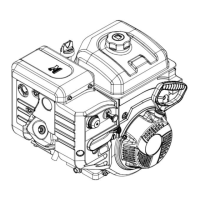CONTACT US AT www.DRpower.com 21
STORAGE / TRANSPORTING
Storing Your Engine
Proper storage preparation is essential for keeping your engine trouble free and looking good. The following steps will help to keep
rust and corrosion from impairing your engine’s function and appearance and will make the engine easier to start after storage.
Cleaning
If the engine has been running, allow it to cool for at least half an hour before cleaning. Clean all exterior surfaces, touch up any
damaged paint, and coat other areas that may rust with a light film of oil.
Fuel
Gasoline will oxidize and deteriorate in storage. Old gasoline will cause hard starting, and it leaves gum deposits that clog the fuel
system. If the gasoline in your engine deteriorates during storage, you may need to have the carburetor and other fuel system
components serviced or replaced.
The length of time that gasoline can be left in your fuel tank and carburetor without causing functional problems will vary with
such factors as gasoline blend, your storage temperatures, and whether the fuel tank is partially or completely filled. The air in a
partially filled fuel tank promotes fuel deterioration. Very warm storage/temperatures accelerate fuel deterioration. Fuel
deterioration problems may occur within a few months, or even less if the gasoline was not fresh when you filled the fuel tank.
The Distributor’s Limited Warranty does not cover fuel system damage or engine performance problems resulting from neglected
storage preparation.
You can extend fuel storage life by adding a fuel stabilizer that is formulated for that purpose, or you can avoid fuel deterioration
problems by draining the fuel tank and carburetor.
Using a garden hose or pressure washing equipment can force water into the air cleaner or muffler opening. Water in the air
cleaner will soak the air filter, and water that passes through the air filter or muffler can enter the cylinder, causing damage.
Water contacting a hot engine can cause damage. If the engine has been running, allow it to cool for at least half an hour
before washing.

